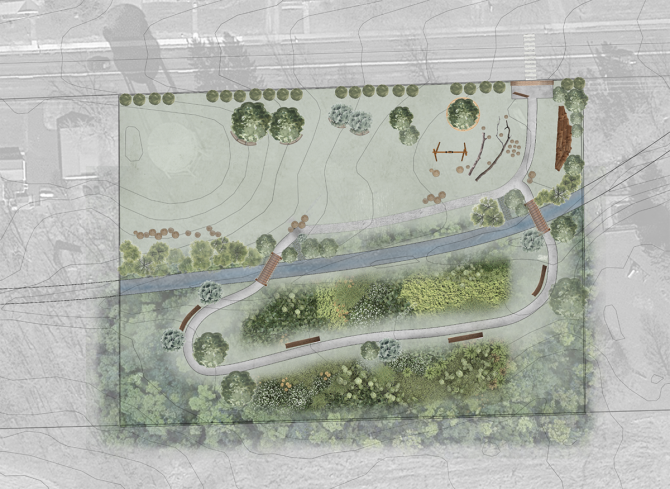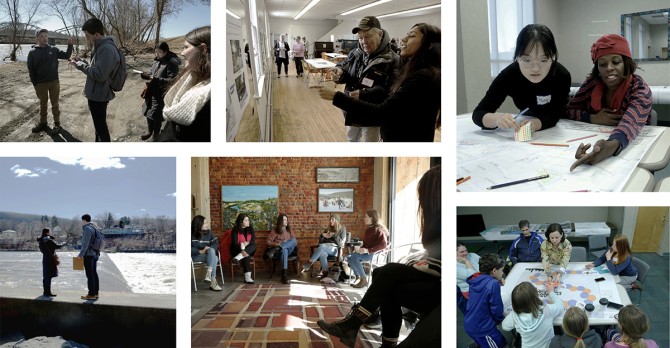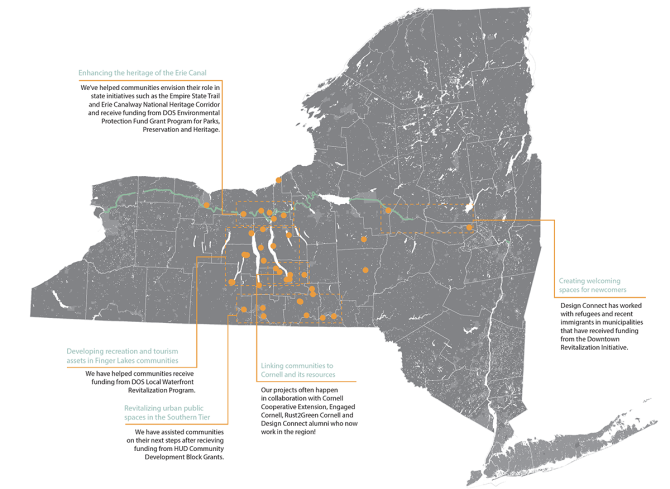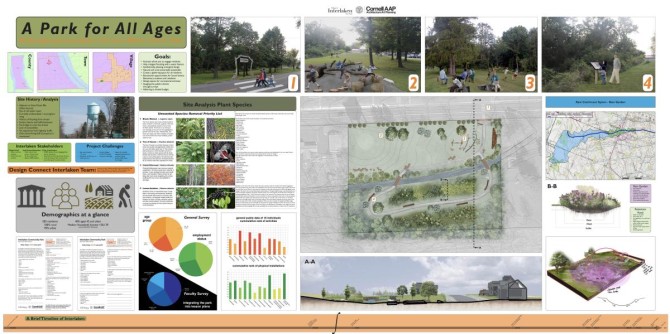News directly from Cornell's colleges and centers
CRP's Design Connect, 13 years of student-led upstate New York impact
By Edith Fikes
According to a ten-year impact report published last year, this is largely because of genuine adaptability and the stabilizing core principles built into the model early on. The authors, Elizabeth Fabis ('19), Jihany Hassun ('21), and Kate Flaherty (M.R.P./L.A. '22) invited reflection from Design Connect cofounders Jennifer Ng ('08) and Chris Hardy ('08) who cited the original preamble to the academic agenda:
"The Design Connect independent study is both a way to provide incentive and accountability for students as well as a means to formalize the pedagogy of experience-based learning. What makes Design Connect projects different from studio courses is the combination of real-world community practice, interdisciplinary collaboration, and student empowerment. While providing a service to communities, students are also expected to further their knowledge and reflect on the lessons they learn from on-the-ground experience, guided by faculty members."
From the first, Design Connect has been about bringing people, ideas, and resources together around design processes that can advance a given community's vision, says longtime CRP advising faculty Michael Tomlan, professor and director of historic preservation planning. "Growing up in Upstate New York, it was always apparent to me that the people who had expertise and access to support for community projects were unequally distributed. This is all the more obvious in Ithaca where bright young people who want to help communities gather to pursue their education. At Cornell, the resources seem to be ever in reach."
Potential partnerships between Design Connect teams and communities across the region begin with inviting organizations, municipalities, and residents to share their project ideas via an application process that takes place twice each year. Projects are selected and announced at the beginning of each semester students have the opportunity to enroll in the class for academic credit. Projects that may be of mutual benefit to both communities and students move forward and often begin with a student-led public outreach event with the sole intent of listening and understanding local conditions and concerns. The design and planning process progresses from there, often resulting in site analyses, reports, and plans that support the community's further efforts to actualize their vision. Over time, Design Connect has kept its own vision intact while expanding in scope. Today, the organization integrates overlapping foci including design activism, community connection, and equity in civic spaces.
According to the impact report, from 2015 to 2020, Design Connect teams partnered with 37 communities on 45 projects in 18 different counties to complete projects, including those that address food deserts and equal access to other amenities, public parks that suit needs across difference, historic preservation, adaptive reuse, and large rail-to-trail sections of notable success for partner groups in Hammondsport and Dryden, New York. In fall 2020, Design Connect students made an impact on the community of Waterloo with plans to convert a 20-year neglected historic building, the Waterloo Organ Company, into a three-level center for the arts. This spring, a Design Connect team partnered with Tomkins County Area Transit and the Cayuga Trails Club to create a map for people seeking information about how they might access green spaces and the natural areas of the Finger Lakes by public transportation.
This fall, a Design Connect team consisting of graduate and undergraduate students from AAP, the College of Agriculture and Life Sciences, and College of Human Ecology — led by Jason Rearick (M.R.P. '21) and Cynthia Liao (B.S. URS '23) — responded to a brief that began "Currently, the Village of Interlaken does not have a community park to call their own." Over the course of the semester, the students worked with the village leadership and community to understand their vision for "a park that contributes to ecological support through flood mitigation and aesthetic beauty...providing a 'green' place to gather."
"I learned the immense value of working with a diverse group of individuals to create something tangible for a real-world client," says Rearick. "This diversity not only came from individual backgrounds but also in expertise; it was illuminating learning new things and new approaches from the different team members. I absolutely could not pull this off without their expertise and efforts. It is also very satisfying to know that what we are doing is not just academic but we will have a tangible effect on a local community. It is my hope that in the near future I can share our collective big dreams for this park with my son when this project is completed."
Design Connect is student-led organization and workshop housed in CRP. The workshop is open to graduate and undergraduate students from any degree program at Cornell who want to join a team for credit and experience working outside the classroom while partnering with Upstate New York communities. Projects are announced at the beginning of each semester.
Stay connected! Follow @cornellaap on instagram, facebook, twitter, and linkedIn; and subscribe to our AAP bi-weekly newsletter.
This story first appeared in the News section of the Architecture, Art, and Planning website.
Media Contact
Get Cornell news delivered right to your inbox.
Subscribe




